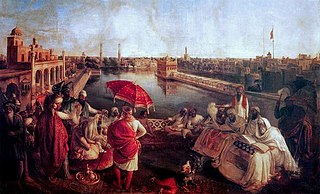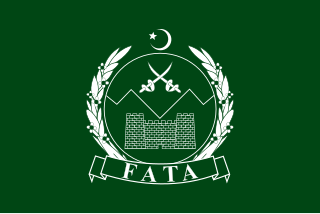
Sikhs are an ethnoreligious group who adhere to Sikhism, a religion that originated in the late 15th century in the Punjab region of the Indian subcontinent, based on the revelation of Guru Nanak. The term Sikh has its origin in the Sanskrit word śiṣya, meaning 'seeker', 'disciple' or 'student'.

Indian Airlines Flight 814, commonly known as IC 814, was an Indian Airlines Airbus A300 en route from Tribhuvan International Airport in Kathmandu, Nepal to Indira Gandhi International Airport in Delhi, India. On Friday, 24 December 1999, it was hijacked and was flown to several locations before landing in Kandahar, Afghanistan.
A jirga is an assembly of leaders that makes decisions by consensus according to Pashtunwali, the Pashtun social code. It is conducted in order to settle disputes among the Pashtuns, but also by members of other ethnic groups who are influenced by them in present-day Afghanistan and Pakistan.

Terrorism in Pakistan, according to the Ministry of Interior, poses a significant threat to the people of Pakistan. The wave of terrorism in Pakistan is believed to have started in 2000. Attacks and fatalities in Pakistan were on a "declining trend" between 2015 and 2019, but has gone back up from 2020-2022, with 971 fatalities in 2022.

Sikhism in Pakistan has an extensive heritage and history, although Sikhs form a small community in Pakistan today. Most Sikhs live in the province of Punjab, a part of the larger Punjab region where the religion originated in the Middle Ages, with some also residing in Peshawar in the Khyber-Pakhtunkhwa province. Nankana Sahib, the birthplace of Guru Nanak, the founder of Sikhism, is located in Pakistan's Punjab province. Moreover, the place where Guru Nanak died, the Gurudwara Kartarpur Sahib is also located in the same province.
The Gurjar are an agricultural ethnic community, residing mainly in India, Pakistan and Afghanistan, divided internally into various clan groups. They were traditionally involved in agriculture, pastoral and nomadic activities and formed a large heterogeneous group. The historical role of Gurjars has been quite diverse in society: at one end they have been founders of several kingdoms and dynasties and, at the other end, some are still nomads with no land of their own.

The insurgency in Khyber Pakhtunkhwa, also known as the War in North-West Pakistan or Pakistan's war on terror, is an ongoing armed conflict involving Pakistan and Islamist militant groups such as the Tehrik-i-Taliban Pakistan (TTP), Jundallah, Lashkar-e-Islam (LeI), TNSM, al-Qaeda, and their Central Asian allies such as the ISIL–Khorasan (ISIL), Islamic Movement of Uzbekistan, East Turkistan Movement, Emirate of Caucasus, and elements of organized crime. Formerly a war, it is now a low-level insurgency as of 2017.
Fazal Hayat, more commonly known by his pseudonym Mullah Fazlullah, was an Islamist jihadist militant who was the leader of the Tehreek-e-Nafaz-e-Shariat-e-Mohammadi, and was the leader of the Tehreek-e-Taliban Pakistan in Swat Valley. On 7 November 2013, he became the emir of the Tehrik-i-Taliban Pakistan, and presided over the descent of the group into factions who are often at war with each other. Fazlullah was designated by the Al-Qaida and Taliban Sanctions Committee of the Security Council in 2015, and was added to the U.S. State Department's Rewards for Justice wanted list on 7 March 2018. Fazlullah was killed in a U.S. drone strike in Kunar, Afghanistan on 14 June 2018.

Lashkar-e-Islam, also written as Laskhar-i-Islam, is a Deobandi jihadist terrorist group operating in Khyber District, Khyber-Pakhtunkhwa Province, Pakistan and the neighboring Nangarhar Province, Afghanistan.

The Pakistani Taliban, formally called the Tehreek-e-Taliban-e-Pakistan, is an umbrella organization of various Islamist armed militant groups operating along the Afghan–Pakistani border. Formed in 2007 by Baitullah Mehsud, its current leader is Noor Wali Mehsud, who has publicly pledged allegiance to the Afghan Taliban. The Pakistani Taliban share a common ideology with the Afghan Taliban and have assisted them in the 2001–2021 war, but the two groups have separate operation and command structures.

The Khyber Pass is a mountain pass in the Khyber Pakhtunkhwa province of Pakistan, on the border with the Nangarhar Province of Afghanistan. It connects the town of Landi Kotal to the Valley of Peshawar at Jamrud by traversing part of the White Mountains. Since it was part of the ancient Silk Road, it has been a vital trade route between Central Asia and the Indian subcontinent and a strategic military choke point for various states that controlled it. The Khyber Pass is considered one of the most famous mountain passes in the world.

The Federally Administered Tribal Areas, commonly known as FATA, was a semi-autonomous tribal region in north-western Pakistan that existed from 1947 until being merged with the neighbouring province of Khyber Pakhtunkhwa in 2018 through the Twenty-fifth amendment to the constitution of Pakistan. It consisted of seven tribal agencies (districts) and six frontier regions, and were directly governed by the federal government through a special set of laws called the Frontier Crimes Regulations.

Sikhism inAfghanistan in the contemporary era is limited to small populations, primarily in major cities, with the largest numbers of Afghan Sikhs living in Jalalabad, Ghazni, Kabul, and to a lesser extent in Kandahar and Khost. Sikhs have been the most prevalent non-Muslim minority in Afghanistan, and despite the many political changes in recent Afghan history, governments and political groups have generally not indulged in openly discriminating against the Sikh minority; however, their status have been severely impacted amid the country's conflict since 1978.

The Orakzai and Kurram offensive, also known as Operation Khwakh Ba De Sham was a Pakistani military operation against the Tehrik-i-Taliban in the Orakzai Agency and Kurram Agency area of the Federally Administered Tribal Areas that began on 23 March 2010. It was part of the War in North-West Pakistan.
The 2011 India–Pakistan border skirmish was a series of incidents which took place during the months of July and August 2011 across the Line of Control in Kupwara District and Neelam Valley. Both countries gave different accounts of the incident, each accusing the other of initiating the hostilities.
These are the list of Terrorist attacks in Pakistan in 2010.

The 2012 Khyber Agency bombing occurred on 10 January 2012, when a bomb exploded near a petrol pump in the town of Jamrud near the Afghan border in Khyber Agency of the Federally Administered Tribal Areas (FATA) of Pakistan. The bombing killed at least 30 people while 78 others were injured.
This is a list of terrorist incidents in Pakistan in 2012. Pakistan has faced numerous attacks by insurgents as a result of the ongoing War in North-West Pakistan by the Pakistani military against militant groups, part of the War on Terror. At the same time, there have also been numerous drone attacks in Pakistan carried out by the United States which exclusively target members of militant groups along the Afghan border regions.

The 2013 India–Pakistan border incidents was a series of armed skirmishes along the Line of Control (LoC) in the disputed Kashmir area. Starting from the mid-January 2013, they have been described as the "worst bout of fighting in the region in nearly 10 years". It began on 6 January 2013, when according to Pakistani reports Indian forces attacked a Pakistani border post, killing one soldier. Indian authorities claimed the incident as a retaliation against preceding Pakistani ceasefire violations, but denied having crossed the demarcation line. In a second skirmish on 8 January, Indian authorities said that Pakistani forces crossed the LoC, killing two Indian soldiers. The incident sparked outrage in India and harsh reactions by the Indian army and government over the news that the body of one of the soldiers had been beheaded. Pakistan denied these reports. On 15 January, a third skirmish reportedly led to the death of another Pakistani soldier.
On 8 June 2014, 10 militants armed with automatic weapons, a rocket launcher, suicide vests, and grenades attacked Jinnah International Airport in Karachi, Pakistan. 36 people were killed, including all 10 attackers, and 18 others were wounded. The militant organisation Tehrik-i-Taliban Pakistan (TTP) initially claimed responsibility for the attack. According to state media, the attackers were foreigners of Uzbek origin who belonged to the Islamic Movement of Uzbekistan (IMU), an Al Qaeda-linked militant organisation that works closely with TTP. The TTP later confirmed that the attack was a joint operation they executed with the IMU, who independently admitted to having supplied personnel for the attack.














